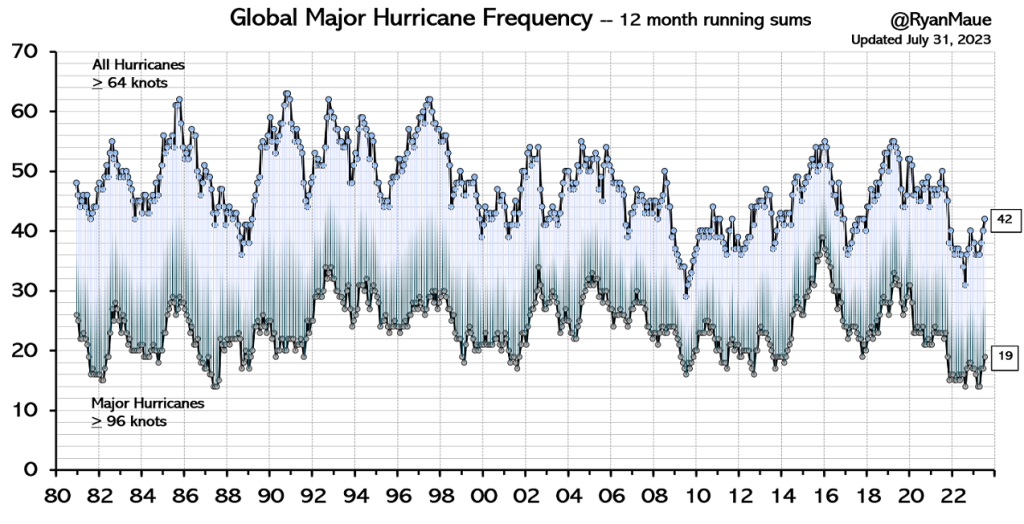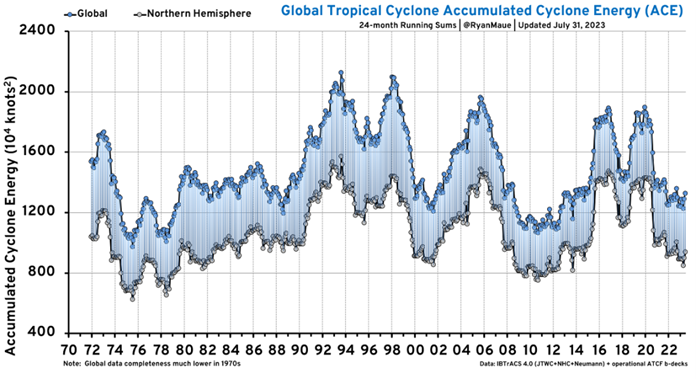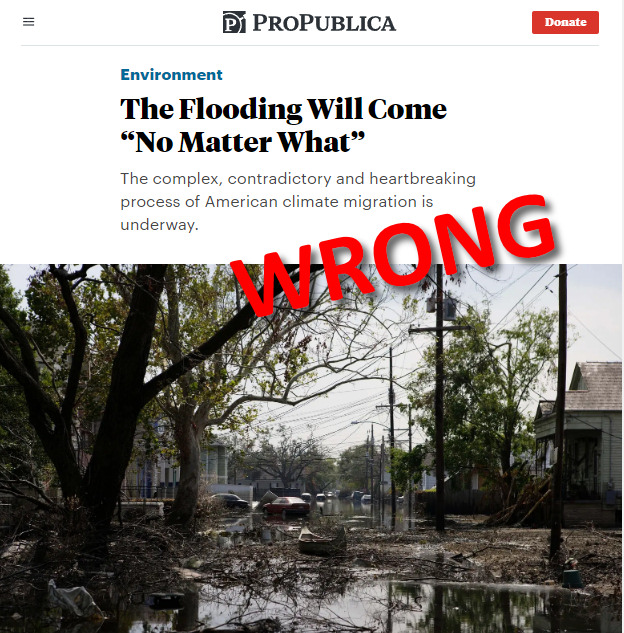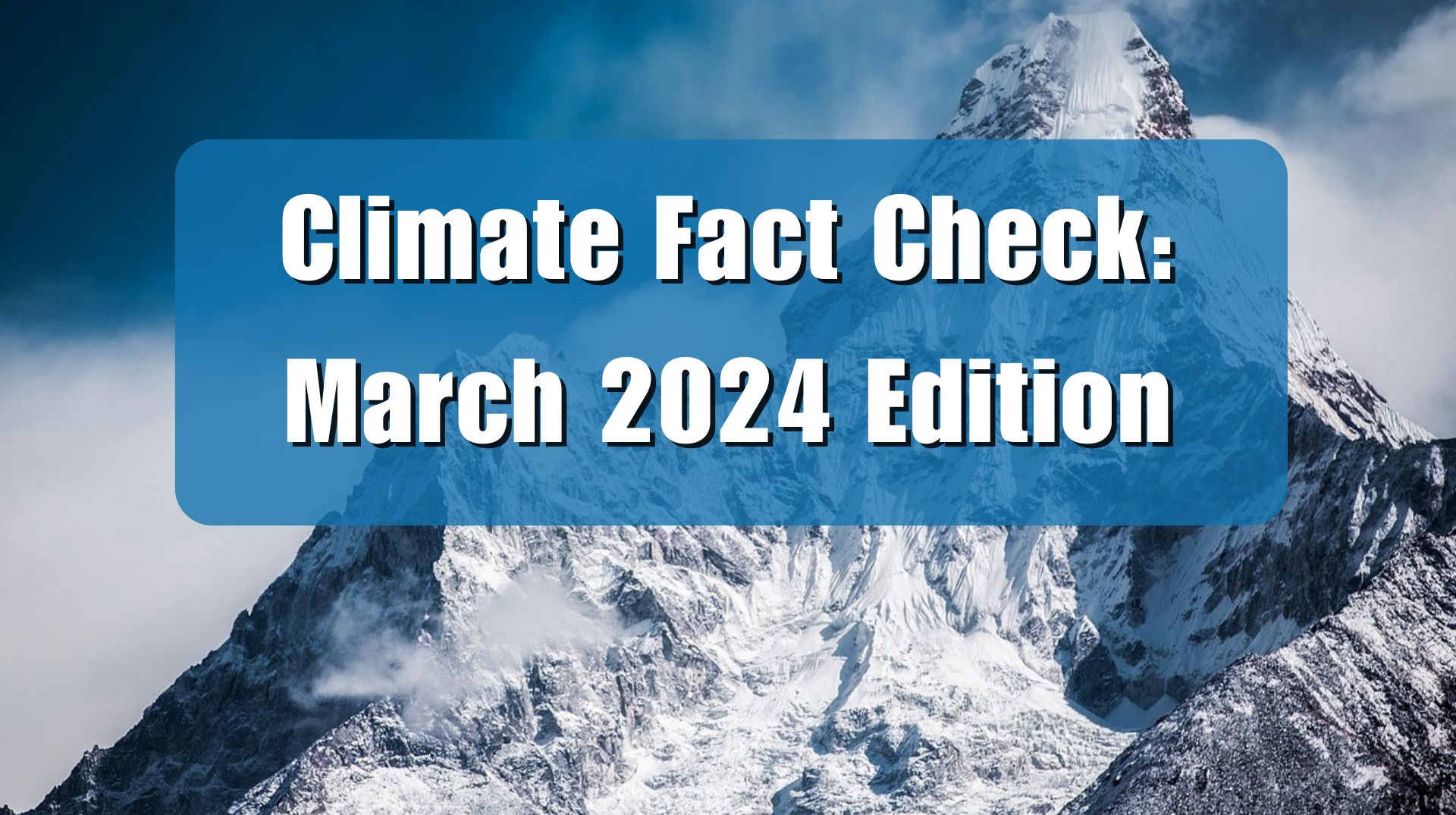An article by the website ProPublica titled The Flooding Will Come “No Matter What” linked to Hurricane Katrina, storm refugees, and climate change, claiming that the storm was evidence of the beginning of a “climate migration” in America. The connection is false. Data refutes a climate connection to any particular hurricane or trend in migration.
The article does a lot of rambling coverage of a family that was displaced by Hurricane Katrina back in 2005, saying:
Another great American migration is now underway, this time forced by the warming that is altering how and where people can live. For now, it’s just a trickle. But in the corners of the country’s most vulnerable landscapes — on the shores of its sinking bayous and on the eroding bluffs of its coastal defenses — populations are already in disarray.
The article goes on to follow the trials and tribulations of a single family who had their home destroyed during Hurricane Katrina. Pro Publica believes this case is evidence of climate change causing a “migration,” because the family have not moved back to the same location.
The article itself cites no data and or study to support its claim about hurricane Katrina. Rather, it simply state’s the author’s opinions as if it were an established fact. Later article similarly describes families displaced by the 2018 campfire in Paradise CA, as climate refugees writing:
As the number of displaced people continues to grow, an ever-larger portion of those affected will make their moves permanent, migrating to safer ground or supportive communities. They will do so either because a singular disaster like the 2018 wildfire in Paradise, California — or Hurricane Harvey, which struck the Texas and Louisiana coasts — is so destructive it forces them to, or because the subtler “slow onset” change in their surroundings gradually grows so intolerable, uncomfortable or inconvenient that they make the decision to leave, proactively, by choice.
First, it should be noted that weather events such as a hurricane are not proof of climate change, and ProPublica is falsely conflating short term weather events with long-term climate change. Further, as discussed in Climate at a Glance: Hurricanes, even the U.N. Intergovernmental Panel on Climate Change (IPCC) admits to finding no increase in the long-term frequency or severity of hurricanes. Also, after Katrina, the United States went through its longest period in recorded history without a major hurricane strike, and recently experienced its fewest total hurricanes in any eight-year period. There has been no increase in the number or intensity of tropical cyclones since 1972 as the planet has modestly warmed. Indeed, for some basins the data suggests tropical cyclone frequency has actually declined over the past century.
Data presented in more than 100 previous Climate Realism posts, here, here, here, and here, for example, clearly show that hurricane trends are relatively flat over the past 50 years of modest warming, and the trend in powerful Atlantic hurricanes is downward (see the figures below)


Simply put, contrary to the claims made by ProPublica, there is no upward trend in hurricane frequency or intensity, and thus claims that climate driven migration, leaving “populations in disarray,” is completely false.
The claim made about wildfire in Paradise, CA causing “climate driven migration,” is equally false. Paradise burned to the ground during the 2018 Camp Fire, which was due to lack of maintenance on Pacific Gas and Electric power lines. That was combined with a weather event causing high winds on a single day and low fuel moisture to create the perfect storm of flammability. California’s drought at the time was certainly a contributing factor, though drought has been historically common across the region, due by periodic weather patterns in the Pacific Ocean.
These patterns have occurred for millennia and are not a feature of man-made climate change. In fact, tree ring studies of the western United States show past mega-droughts lasted as long as 200 years at times.
A report from California State University notes active forest management is a key practice in preventing wildfire.
“One of the reasons we’re observing more fires is because of 100 years of poor Forest Service policy where we didn’t allow prescribed fire or wildfires to burn,” says Dr. Craig Clements, a San Jose State University meteorology and climate science professor and director of the school’s Fire Weather Research Laboratory.
So, poor forest management and poorly maintained power lines affected by weather led to the wildfire devastation in Paradise, not climate change.
ProPublica simply failed to do basic research, relying on opinion and storytelling instead of factual reporting to weave yet another misleading story where climate change is blamed as part of the ongoing narrative told by the media blaming climate change for everything bad, even when the facts clearly say otherwise.
















